This week, Capital One sparked a conversation about some pretty big topics: innovation, education, the way we work and live, and how Dallas has the potential to be an international hub. But, the discussion was more focused than that, as everything centered around a core topic—technology.
Capital One hosted its Reimagine Communities Symposium yesterday, and people from across the country gathered to explore how harnessing technology could increase access to opportunity. The peer learning event touched on a variety of topics during the numerous panels, honing in on workplace evolution, education and learning, creating places of opportunity, and big data and analytics.
In his opening letter, President of Financial Services Sanjiv Yajnik called Reimagine Communities a “platform for thoughtful conversations on innovation,” and the pinnacle of Capital One’s multi-year Future Edge initiative.
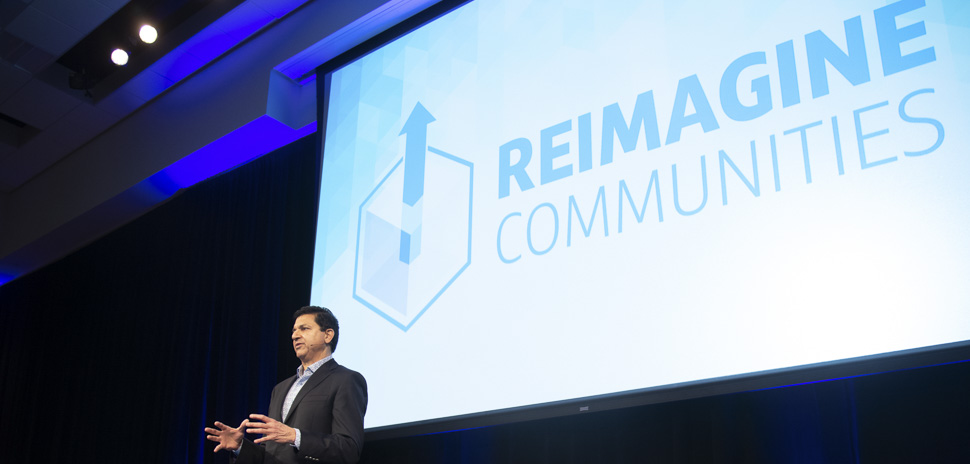
Sanjiv Yajnik welcoming attendees to the Capital One Reimagine Communities Symposium. [Photo by Grant Miller]
At the symposium, the results of Capital One’s 2018 Future Edge DFW survey were released, and Yajnik provided Dallas Innovates with further insight on why they were so important. Residents are becoming increasingly more confident about Dallas-Fort Worth becoming the go-to technology hub in the country—and Yajnik said, in order to make that happen, a cooperative enterprise was needed from within the region.
READ NEXT How Dallas Has to Become a Tech Hub From the Inside Out
The symposium, Reimagine Communities, further explored this idea, and broadened the scope to examples across the country. If you couldn’t make this year’s event, we rounded up some key takeaways from the panels: Ideas that have the potential to drive technology in communities across North Texas—and the country—forward.
The panel recap from Reimagine Communities
Each hour-long panel touched on such a wide span of vital topics, a closing session panel was held to recap the core insights discussed. Moderated by Capital One’s Catherine Foca, a panelist from each session summarized what attendees might have missed, ways to think about these different issues, and what we should do next.
Workplace Evolutions
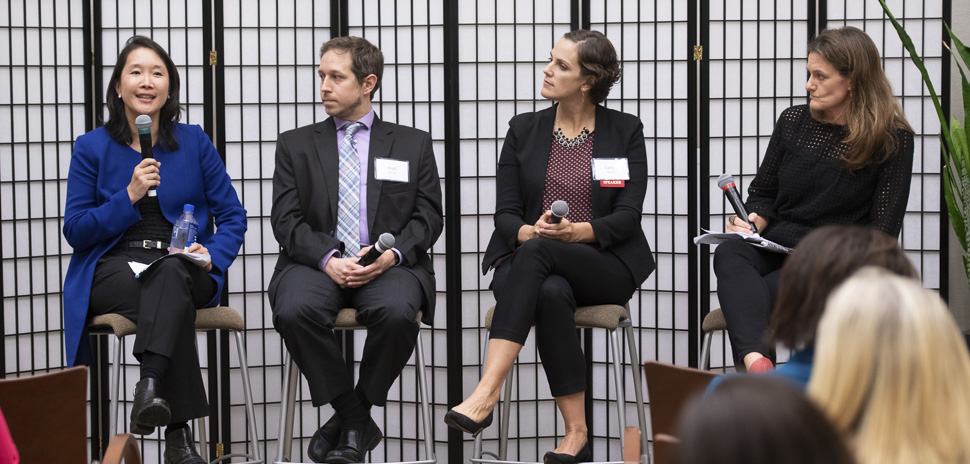
From left: Jenny Yang, Mark Garcia, Caitlyn Brazill, Rachel Maguire speaking at the Workplace Evolutions panel. [Photo by Grant Miller]
Topic: This panel was about AI and automation, and how the technologies changed the nature of work, skill requirements, and job quality.
Recap Panelist: Jenny Yang, Urban Institute
Major Takeaways: It’s important to educate for the workforce of tomorrow, and it’s going to be difficult for those in education to keep up with the high speed at which things are changing in the workforce.
Infrastructure: A few different implementations could take place, such as training programs or corporations investing in eResources.
Data: Data could be used to expand opportunities, analyze job-related skills needed, and avoid potential workforce bias.
Measurement: Yang asked: “What can we do differently to include all technologies [in the workplace]?
Education and Learning
Topic: This panel was about how technology can support new models of education, learning, and skills-building to better prepare young adults for the jobs of the future.
Recap Panelist: Shayne Spaulding, Urban Institute
Major Takeaways: Characteristics of students are changing, and nontraditional students are becoming the new normal. It’s important to make sure education is accessible to all learners, and we have to think about how to leverage technology to support these students.
Infrastructure: Spaulding asked, “Why do we think about broadband differently [than other resources]?”
Data: Data can sometimes leave out part of the real picture, such as those not using social media or posting things online.
Looking Forward: Spaulding said she now wants to research how education can benefit from tech, and look at different hybrid learning approaches.
Creating Places of Opportunity
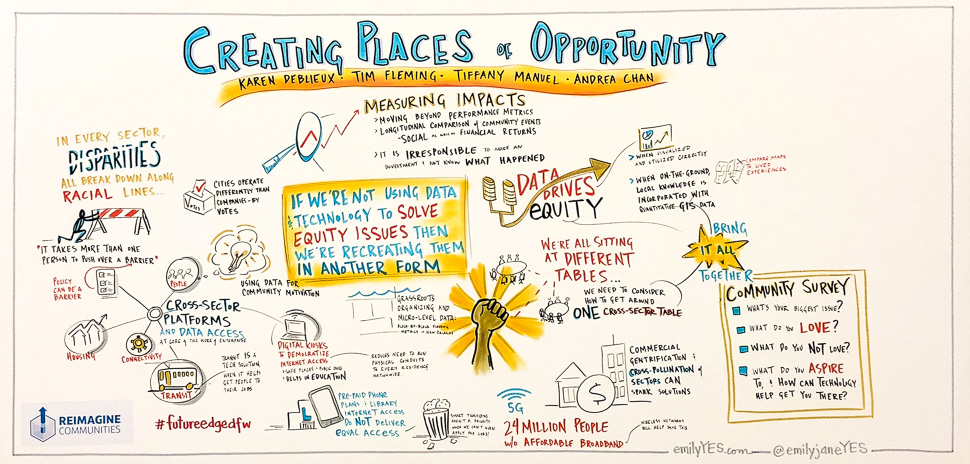
During the panel, Graphic Recorder Emily Jane Steinberg captured key insights in real-time. [Photo by Alex Edwards]
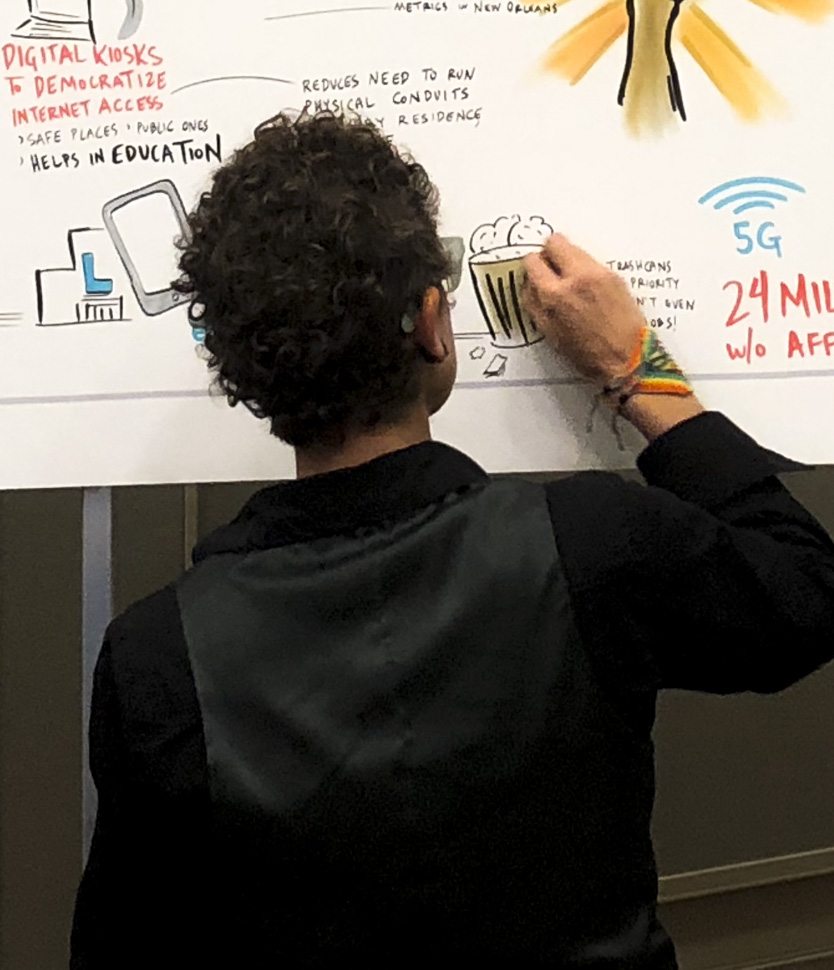
Graphic Recorder Emily Jane Steinberg
Topic: This panel was about how technology is shaping communities and how technological innovation could affect entrepreneurship, community needs, effective solutions, and well-being in historically dis-invested neighborhoods.
Recap Panelist: Tiffany Manuel, Enterprise
Major Takeaways: A variety of folks are left out of the tech revolution, so it’s important to make sure everyone has a seat at the table. It’s also valuable to look at who is partnering and to utilize those partnerships.
Infrastructure: From a utility perspective, Manuel said, “We aren’t doing a great job.” Tech should be used as a way to bring different people in, because the needs of all populations aren’t always served.
Data: Data has breadth and depth that have to be weaved together. When looking at neighborhood data, it’s vital to compare results to the overall region and the state.
Looking Forward: Manuel encouraged people to think about the folks in their own circles, and ask if technology was being used in the correct way to learn.
Big Data and Analytics
Topic: This panel was about how new techniques to process big data can help overcome inequality and discrimination, and promote inclusion.
Recap Panelist: Regina Nippert, Southern Methodist University
Major Takeaways: Data can be proved useful, depending on the context and the relationship. If you want to improve usefulness, data needs to be a shared objective.
Infrastructure: It’s important to look forward to what people are constantly doing, and how to leverage technology to improve various conditions.
Data: Quantitative data should create bridges, not divides.
Measurement: Measurement has to be made into something that people feel.
Who else was there?
The all-day event was powered by Capital One and the Urban Institute on the Capital One campus in Plano. The four core panels were bookended by Yajnik’s welcome address and a networking reception. In total, an all-star lineup of 21 speakers and panelists were in attendance:
- Sanjiv Yajnik, President of Financial Services, Capital One
- Caitlyn Brazill, Executive Vice President, Development & Communications at Per Scholas
- Andrea Chen, Executive Director, Propeller
- Payal Dalal, Vice President, Global Programs at the Mastercard Center for Inclusive Growth
- Karen DeBlieux, Head of US Corporate Banking and Market President, Capital One
- Tim Fleming, Director of Enterprise Sustainability, AT&T
- Catherine Foca, Vice President and Community Affairs President, Capital One Foundation
- Mark Garcia, Dean of Strategic Initiatives, Collin College
- Soloman Greene, Senior Fellow, Research to Action Lab and the Metropolitan Housing and Communities Policy Center at the Urban Institute
- Christopher Kingsley, Senior Associate for Data Initiatives, Annie E. Casey Foundation
- Rachel Maguire, Research Director, Institute for the Future
- Tiffany Manuel, Public Will-Building Expert and Strategist & Cross-Sector Leader, Enterprise
- Laura Bailey, Senior Vice President, External Affairs, Capital One
- Regina Nippert, Executive Director of the Budd Center, SMU
- Erika Poethig, Vice President Chief Innovation Officer, Urban Institute
- J. Puckett, Senior Partner & Managing Director of Education Practice, Boston Consulting Group
- Lou Pugliese, Senior Innovation Fellow at ALab, Managing Director at Arizona State University
- Kurt Schaal, Senior Vice President of Middle Market Commercial Banking, Capital One
- Sonal Shah, Executive Director at the Beeck Center for Social Impact, Georgetown University
- Shayne Spaulding, Principal Research Associate at the Income and Benefits Policy Center, Urban Institute
- Jenny R. Yang, Non-Resident Fellow, Urban Institute
For a complete list of speaker bios, or to learn more about the event, explore here.
![]()
Get on the list.
Dallas Innovates, every day.
Sign up to keep your eye on what’s new and next in Dallas-Fort Worth, every day.










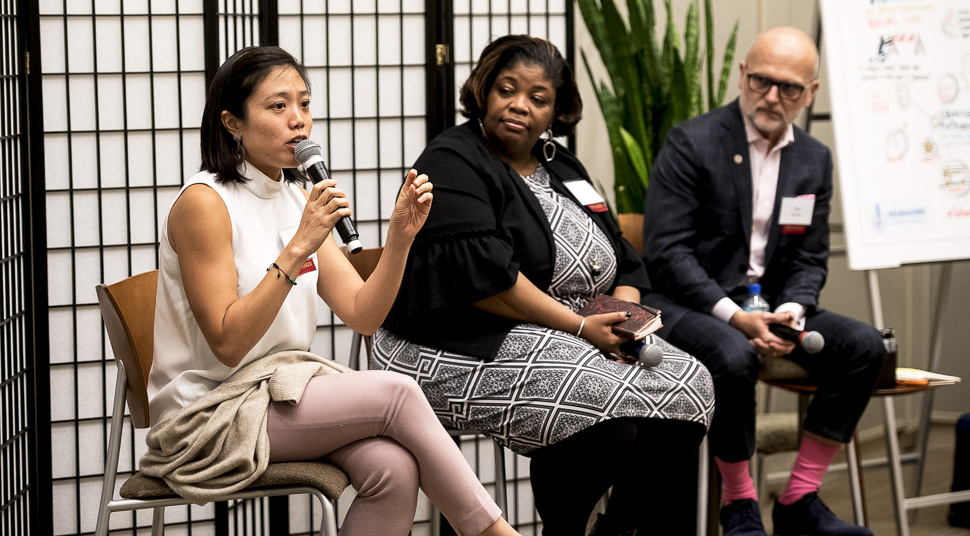
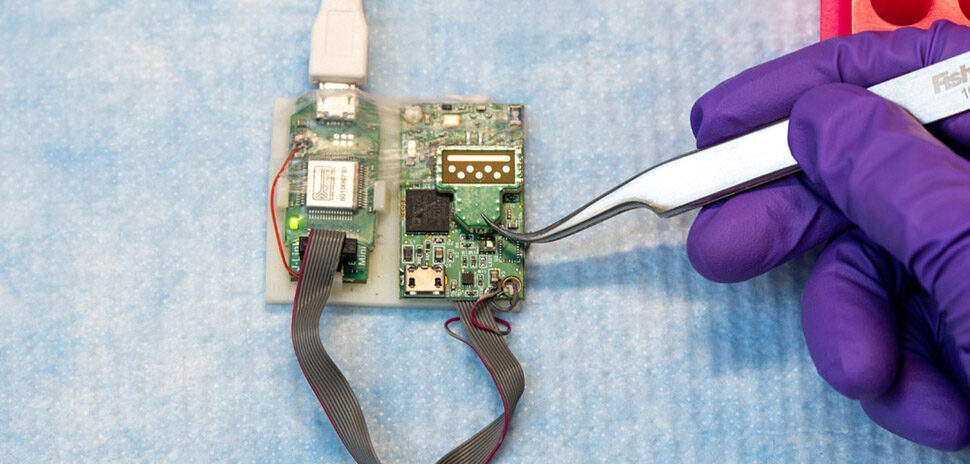
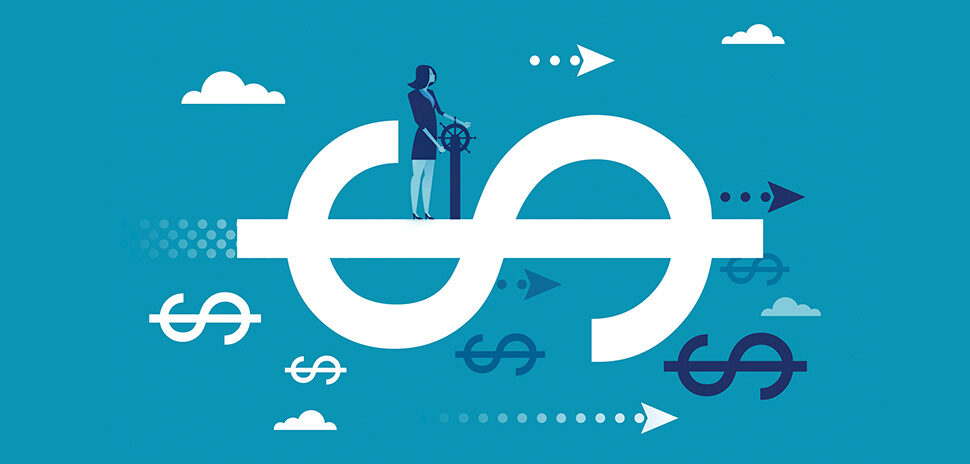


![Clockwise from upper left: John Ficken, Ali Wajahat, Sanjiv Yajnik, Valerie Jarrett, Amanda Cage, Marissa Horne, Alan Cohen, Evan Frazier, Vu Le, Emary Aronson, and Chastity Lord. [Photos via Capital One]](https://s24806.pcdn.co/wp-content/uploads/2021/10/CapitalOne2021ReimagineChangemakers-970x464.jpg)


















































